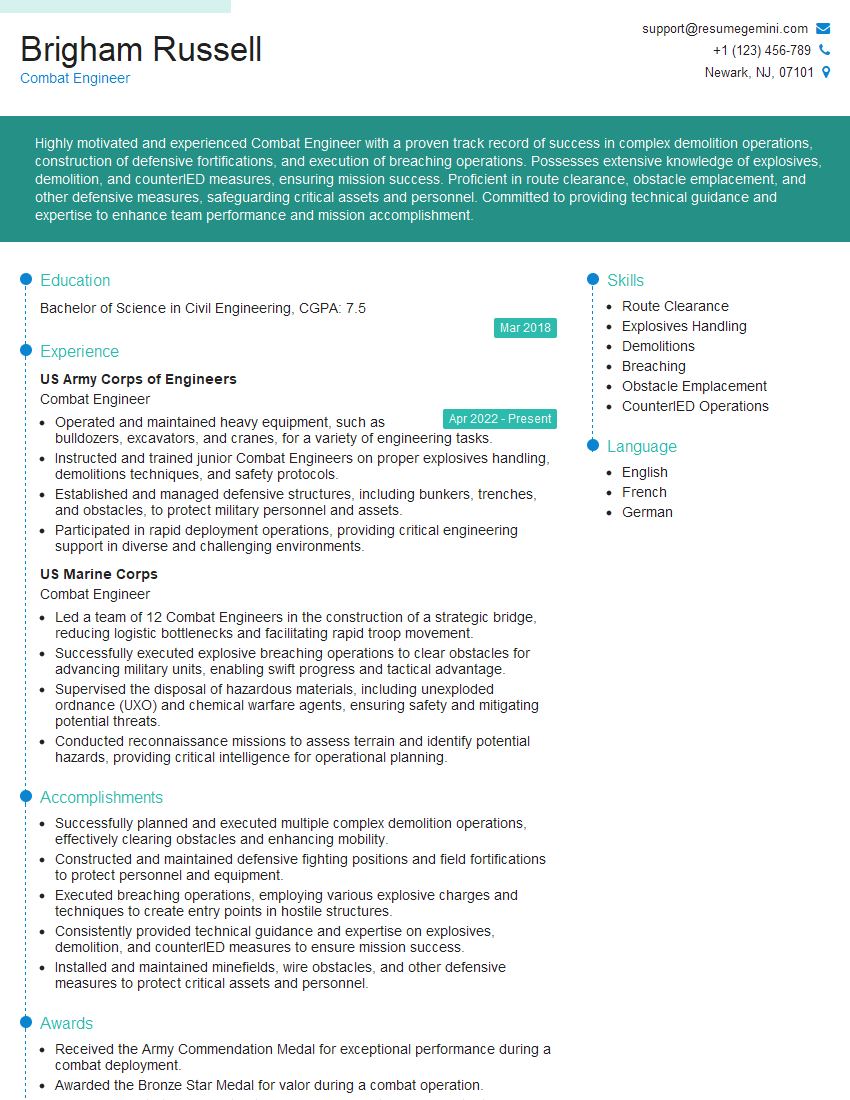Are you a seasoned Combat Engineer seeking a new career path? Discover our professionally built Combat Engineer Resume Template. This time-saving tool provides a solid foundation for your job search. Simply click “Edit Resume” to customize it with your unique experiences and achievements. Customize fonts and colors to match your personal style and increase your chances of landing your dream job. Explore more Resume Templates for additional options.

Brigham Russell
Combat Engineer
Summary
Highly motivated and experienced Combat Engineer with a proven track record of success in complex demolition operations, construction of defensive fortifications, and execution of breaching operations. Possesses extensive knowledge of explosives, demolition, and counterIED measures, ensuring mission success. Proficient in route clearance, obstacle emplacement, and other defensive measures, safeguarding critical assets and personnel. Committed to providing technical guidance and expertise to enhance team performance and mission accomplishment.
Education
Bachelor of Science in Civil Engineering
March 2018
Skills
- Route Clearance
- Explosives Handling
- Demolitions
- Breaching
- Obstacle Emplacement
- CounterIED Operations
Work Experience
Combat Engineer
- Operated and maintained heavy equipment, such as bulldozers, excavators, and cranes, for a variety of engineering tasks.
- Instructed and trained junior Combat Engineers on proper explosives handling, demolitions techniques, and safety protocols.
- Established and managed defensive structures, including bunkers, trenches, and obstacles, to protect military personnel and assets.
- Participated in rapid deployment operations, providing critical engineering support in diverse and challenging environments.
Combat Engineer
- Led a team of 12 Combat Engineers in the construction of a strategic bridge, reducing logistic bottlenecks and facilitating rapid troop movement.
- Successfully executed explosive breaching operations to clear obstacles for advancing military units, enabling swift progress and tactical advantage.
- Supervised the disposal of hazardous materials, including unexploded ordnance (UXO) and chemical warfare agents, ensuring safety and mitigating potential threats.
- Conducted reconnaissance missions to assess terrain and identify potential hazards, providing critical intelligence for operational planning.
Accomplishments
- Successfully planned and executed multiple complex demolition operations, effectively clearing obstacles and enhancing mobility.
- Constructed and maintained defensive fighting positions and field fortifications to protect personnel and equipment.
- Executed breaching operations, employing various explosive charges and techniques to create entry points in hostile structures.
- Consistently provided technical guidance and expertise on explosives, demolition, and counterIED measures to ensure mission success.
- Installed and maintained minefields, wire obstacles, and other defensive measures to protect critical assets and personnel.
Awards
- Received the Army Commendation Medal for exceptional performance during a combat deployment.
- Awarded the Bronze Star Medal for valor during a combat operation.
- Recognized with the Combat Action Badge for direct engagement with enemy forces.
- Decorated with the Purple Heart for wounds sustained in combat operations.
Certificates
- Combat Engineer Specialist (CES)
- Advanced Route Clearance (ARC)
- Explosive Ordnance Disposal (EOD)
- First Responder (FR)
Career Expert Tips:
- Select the ideal resume template to showcase your professional experience effectively.
- Master the art of resume writing to highlight your unique qualifications and achievements.
- Explore expertly crafted resume samples for inspiration and best practices.
- Build your best resume for free this new year with ResumeGemini. Enjoy exclusive discounts on ATS optimized resume templates.
How To Write Resume For Combat Engineer
- Showcase your technical expertise in explosives, demolition, and counterIED operations.
- Highlight your experience in planning and executing complex demolition operations and breaching operations.
- Emphasize your ability to provide technical guidance and expertise to ensure mission success.
- Quantify your accomplishments using specific metrics and results whenever possible.
Essential Experience Highlights for a Strong Combat Engineer Resume
- Plan and execute complex demolition operations to clear obstacles and enhance mobility.
- Construct and maintain defensive fighting positions and field fortifications to protect personnel and equipment.
- Execute breaching operations using various explosive charges and techniques to create entry points in hostile structures.
- Provide technical guidance and expertise on explosives, demolition, and counterIED measures to ensure mission success.
- Install and maintain minefields, wire obstacles, and other defensive measures to protect critical assets and personnel.
- Conduct reconnaissance and surveillance to identify and assess potential threats and hazards.
- Train and supervise subordinates on the safe and effective use of explosives and demolition techniques.
Frequently Asked Questions (FAQ’s) For Combat Engineer
What are the primary responsibilities of a Combat Engineer?
Combat Engineers are responsible for planning and executing demolition operations, constructing and maintaining defensive fortifications, conducting breaching operations, providing technical guidance on explosives and demolition, and installing and maintaining minefields and other defensive measures.
What are the educational requirements for becoming a Combat Engineer?
Most Combat Engineers possess a Bachelor’s Degree in Civil Engineering or a related field.
What are the physical requirements for becoming a Combat Engineer?
Combat Engineers must be in excellent physical condition and able to perform strenuous tasks in challenging environments.
What are the career prospects for Combat Engineers?
Combat Engineers have the opportunity to advance their careers within the military or transition to civilian roles in construction, demolition, and other related fields.
What is the difference between a Combat Engineer and a Civil Engineer?
Combat Engineers specialize in military engineering tasks such as demolition, breaching, and fortification, while Civil Engineers focus on civilian construction projects such as buildings, bridges, and roads.
What are the key skills required for Combat Engineers?
Combat Engineers require skills in explosives handling, demolition, breaching, obstacle emplacement, and counterIED operations.